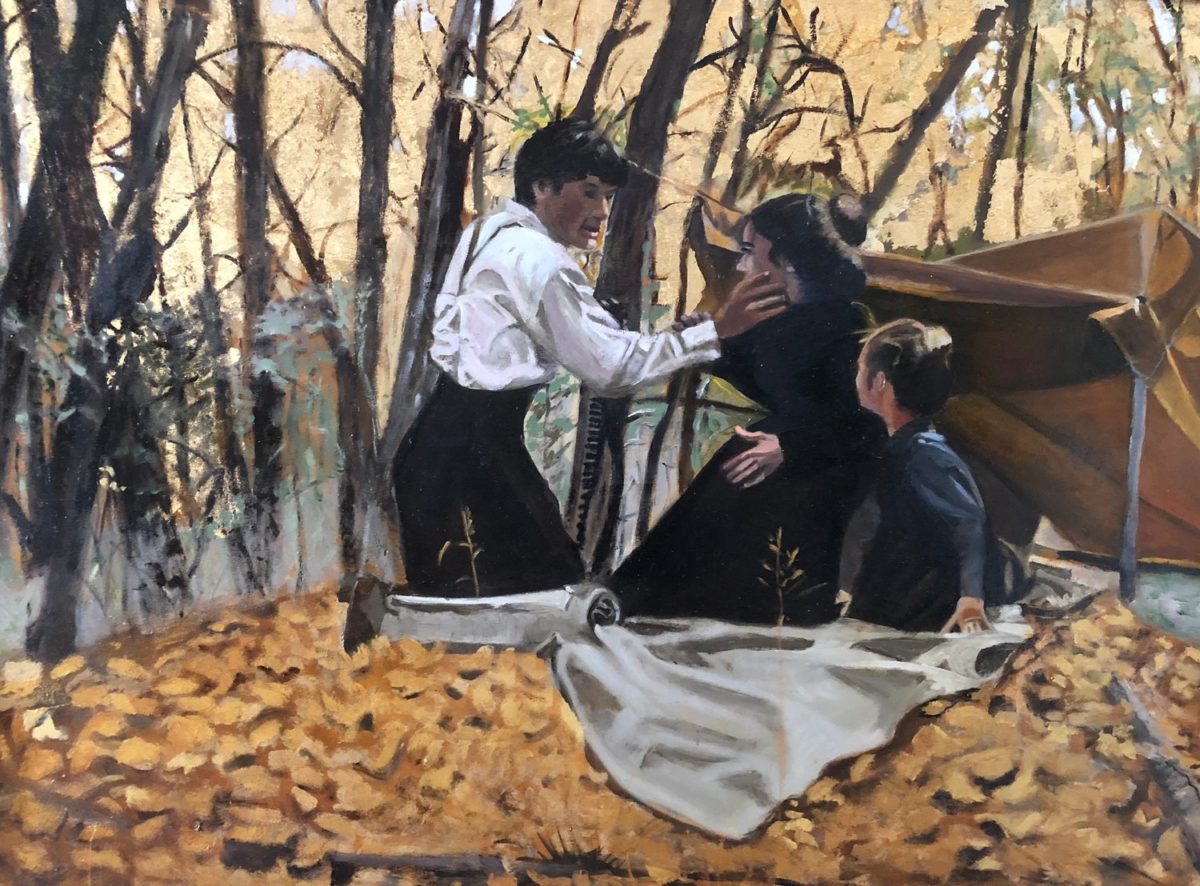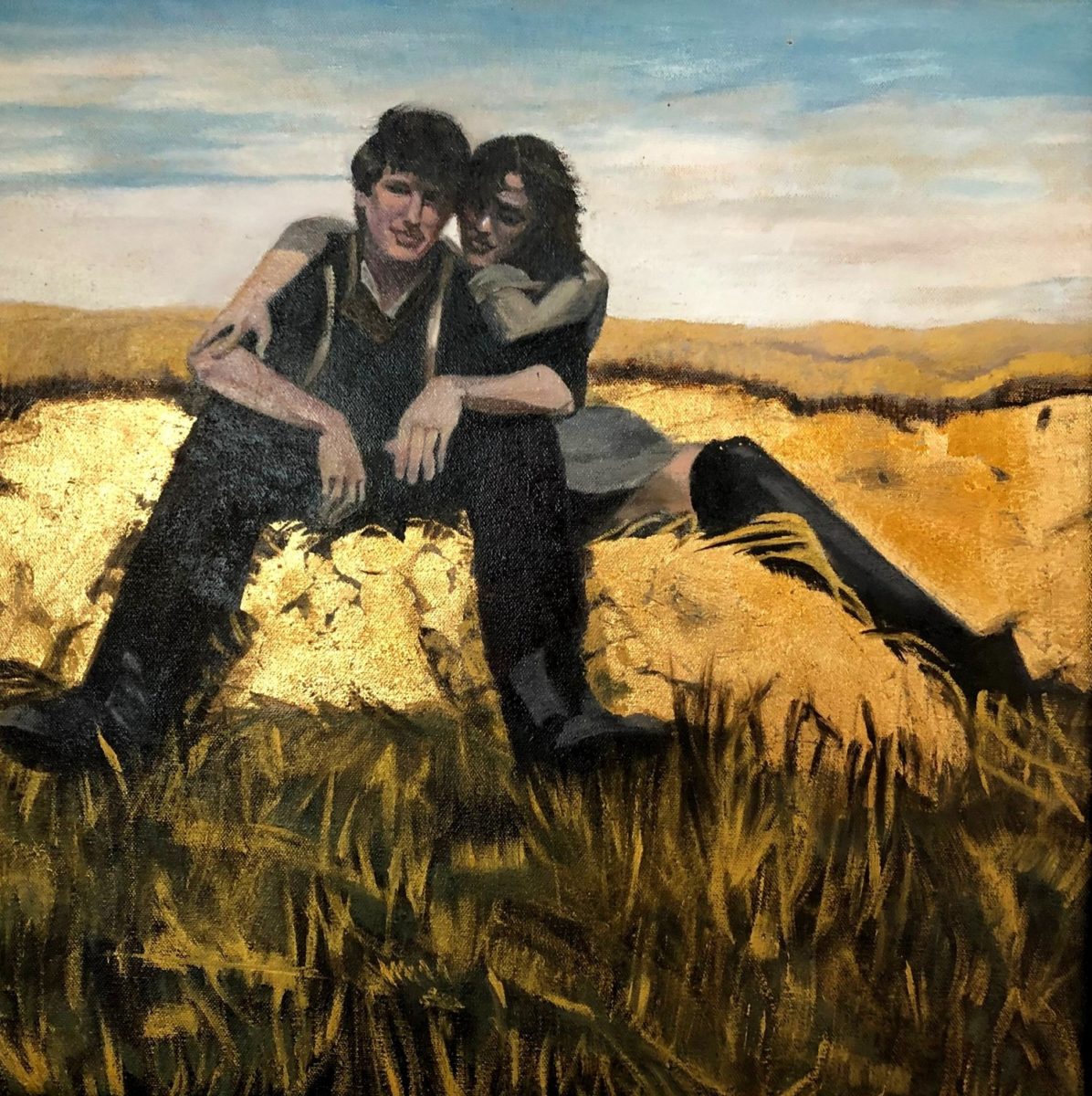Among the most enduring films––not only from the furtive creative period of the 1970s, but all of cinema history––Terrence Malick’s second feature Days of Heaven is a work of ravishing beauty. Like most in that rarified echelon, its path wasn’t easy––Malick clashed with crew as he rebelled against the standardized approaches of cinematography and production, then took two years in the editing room to shape the film (admittedly a short time compared to his modern method) and discover Linda Manz’s essential voiceover. Any battles were well worth the fight as, 45 years later, his 1916-set love triangle tale is often cited as the most visually exquisite film ever made.
With a gorgeous new 4K digital restoration supervised and approved by Malick, camera operator John Bailey, and editor Billy Weber now opening theatrically at NYC’s Film Forum and arriving on the Criterion Collection, I was delighted to speak with the film’s star Brooke Adams, who exudes an enigmatic allure and strength as Abby, who’s caught between Bill (Richard Gere) and a wealthy farmer (Sam Shepard) on the stunning yet unforgiving open plains.
Our interview covers the audition process, Terrence Malick’s method and humor, her Days of Heaven-inspired paintings, recently being embraced by a new generation with the restorations of Tell Me a Riddle and Vengeance Is Mine, and more.
The Film Stage: Days of Heaven was pretty early on in your acting career. I was curious how you first heard about the project, and if Malick ever revealed when you first came on his radar.
Brooke Adams: Well, I first heard about it just because of my agent who set me up for it. And I don’t really know why I knew this was an important film. I mean, I had seen Badlands, which I loved, but I don’t really know what else I knew about it. I never read the script because Terry was very private about it––paranoid, even––and never let anyone know the title or read a script or anything. But I just went and auditioned for the casting director and he put me on tape probably about eight times, never having a script to read. He would just have us do improvisations based on very little information. He told me I was a scrappy, poor girl from Chicago and that it was a love story and a period piece. And that’s really kind of all I knew.
And I auditioned, I remember, with John Travolta, who was actually Terry’s first choice for the Richard Gere role. But John wasn’t allowed out of Welcome Back, Kotter at the time, so he wasn’t able to do it, but I loved auditioning with him. That was really fun. And Geno Havens was the casting director that I kept meeting with. Diane Crittenden was the other casting person, but for some reason I didn’t meet with her. But Geno Havens didn’t really think I was right for the part. So even though I kept going in, I don’t really know why I kept going then. But I did. He put me on tape and one day, apparently, he was scrolling through the tapes to show Terry the possible people and Terry just saw my tape and said, “Wait a minute, who’s that?” And Geno backed it up and showed me. And I guess Terry was interested.
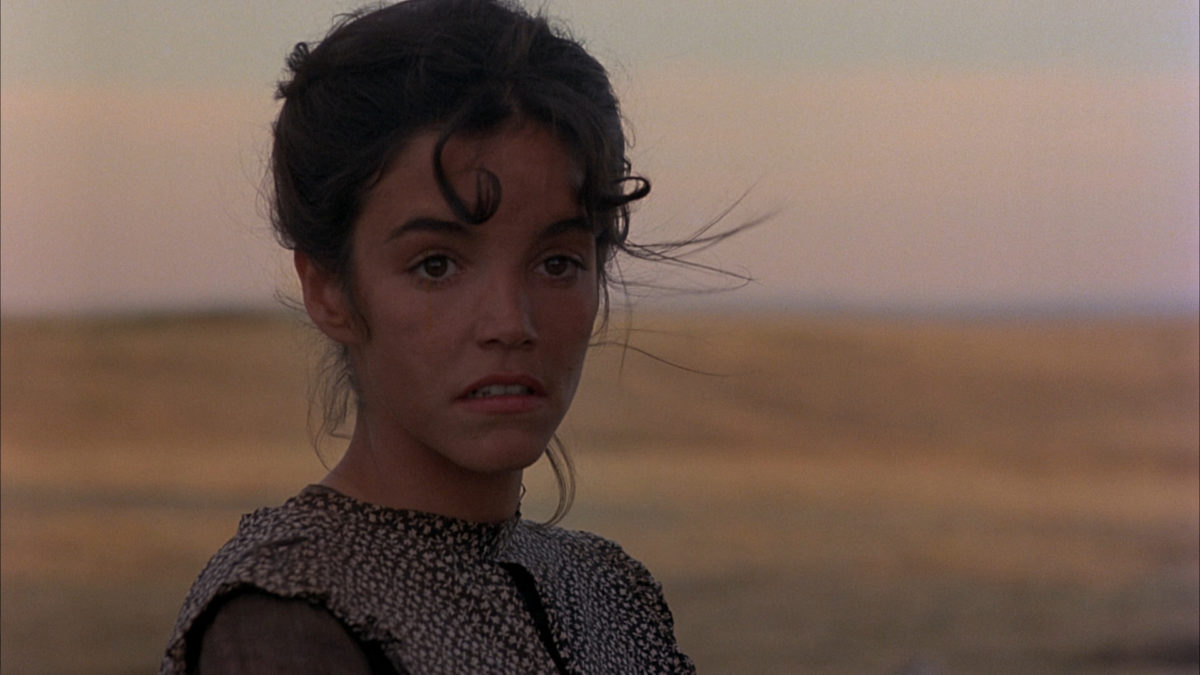
Terry also saw me––I’d done an episode of that TV show Family with Sadie Thompson, and he had seen me in it and liked me on that. So those two things made me a runner-up, I guess. But then once he hired Richard Gere to do the other role, he actually hired Geneviève Bujold to do my role. And so I was, like, devastated. I mean, at this point, I’d had so many auditions and was so excited about it, I had gotten all superstitious about signs that I was saying, “This meant that I would get it. This meant I wouldn’t.” You know, actors are crazy. [Laughs]
So by the time I heard that Geneviève Bujold got it, I was just heartbroken. And then very soon after that, something happened. Richard and Geneviève Bujold went to meet Terry somewhere. And Genevieve, luckily for me, did something wrong. I don’t know what––was rude to Terry or something––and he fired her, and I got the part.
Wow.
And I was just over-the-moon thrilled. I was just so excited. And, I don’t know, I just always thought, “This is going to be a really important film,” and I have no idea why I thought that.
That background is great. Richard Gere has been open in interviews about how the crew didn’t respond to Malick’s more freewheeling style, capturing whatever interested him, especially as it relates to the cinematography team––having the lighting be more natural.
Yeah.
I’m curious, from an actor’s perspective, on set was that both frustrating but then ultimately rewarding when you saw the film? Or did you just go with the flow and embrace the experience?
I would say I went with the flow. You know, I hadn’t done anything really. I mean, I’d done some television, but this was my first big movie. I’d done actually one little horror film before that [Shock Waves], so it wasn’t like I knew what to expect. But I knew, for example, that Néstor Almendros, who was a lovely man, he called it European lighting. He would just throw one light up against a wall and the bounce would be all the lighting we would get. And Terry just liked natural lighting and magic hour––anything we shot outside, we had to wait until the right light. And so we were sitting in our trailer out on the wheat fields all day long. One trailer that had all the costumes and all the actors in it. And we were just sort of sit there all day talking and then suddenly, wow, magic hour was there, and we’d run outside and shoot.
Then, after we’d been shooting for the allotted amount of time, we still hadn’t finished and Néstor had to go and do another film. So they brought in Haskell Wexler. The great Haskell Wexler. And he started lighting a scene, I remember, up in one of the bedrooms in the house, and it just looked like a warm summer day––even though it was snowing out, as I recall. And it was so beautiful that I just thought, “Wow, this is a genius of lighting” and everything. Then Terry walked in and said, “Get rid of all the lights. I don’t use lights. I just want natural light.” So I think, for Haskell, it was very frustrating. For me, I just went with the flow. I just thought Terry was sort of a genius and I didn’t question anything he did.
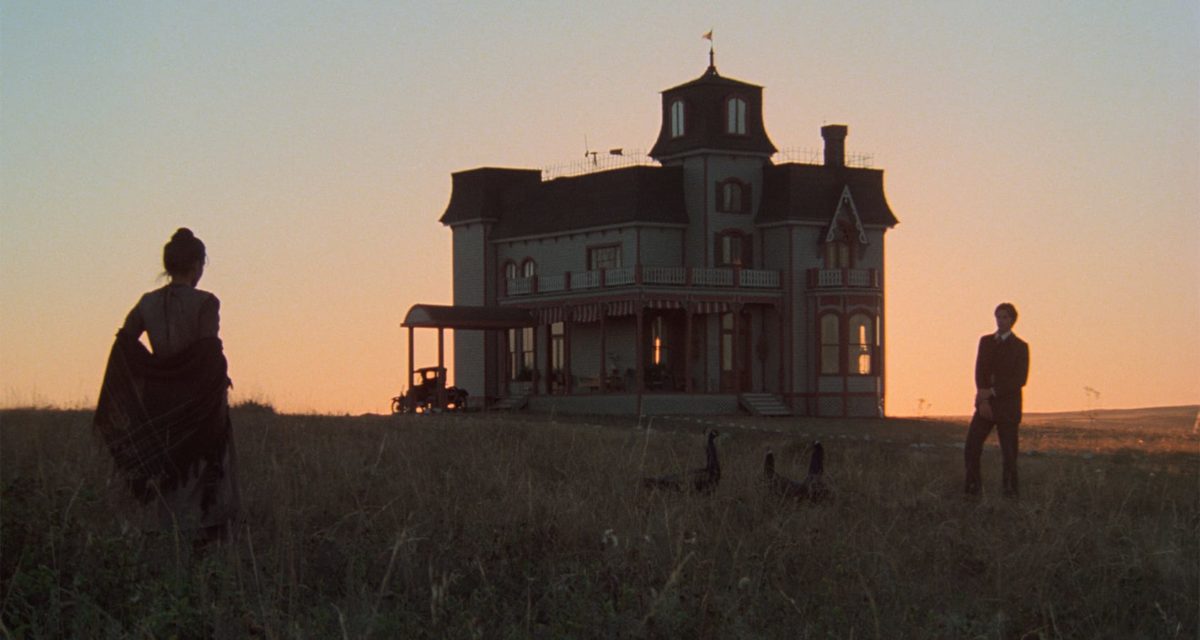
The final result could almost play like a silent film, with how gorgeous the imagery is and the performances being so defined by your presence. So much is said in your eyes, your gestures. As an actor, that might be something you don’t realize until you see the final product. Was it kind of stunning to see a final cut? Malick edited for two years, so you had to wait a while.
Well, it was stunning to see what he put together. But at the time, that part was hard because the script––when I finally actually got to read it––read like a Thomas Hardy novel. It was absolutely gorgeous. And when we started rehearsing it, we were rehearsing it in the hotel in Alberta, Canada––for a week, maybe, we rehearsed, which is already more than you usually get to do in a film. Every time we’d say lines, Terry would say, “Oh God, no, I don’t believe that. Cut it.” And so he just kept cutting our lines. So for all of us, that part was not so much frustrating as incredibly intimidating. We just thought, “Oh boy, we’re really not very good, are we?”
[Both laugh]
And I don’t think Terry really thought we were very good at that point. So he used what he thought worked and that’s what it ended up being. And I think the fact that we don’t do a lot of talking is probably one of the reasons why it’s such an enduring film––because it’s not modern in any way and it’s not language-based. I just think that the silence is what makes it sort of special.
I’ve read a lot of interviews with other actors talking about the process of working with Malick. I’m just curious for you: what kind of approach did he use to inspire you in other ways?
To be honest, Terry was… as I said already, I think he was a genius––is a genius––but he was not really an actor’s director. So he just would say, “Do it this way.” And he’d tell me to sort of stick my jaw out and look over, etc. And I’d say, “But why?” And he’d say, “Because I said so.” He was also very funny and charming, so he would say, [Dons French accent], “This is the méthode Malick.” So I just did that. One time he told Linda Manz if she didn’t do it his way, he was going to shoot her––which was a joke, of course. It wasn’t like he gave us a lot of ideas. He just basically told us what to do.
Got it. It was funny: last week Francis Ford Coppola said on Instagram that Malick was the funniest person he’s ever met, which you may not glean from watching his movies.
Yeah, he was hilarious.
Days of Heaven paintings by Brooke Adams
I also saw, from a few years ago, the paintings you did of Days of Heaven, which are just beautiful. Malick himself I know was inspired by the likes of Vermeer and Hopper, so it was fun to see it come full-circle. What was it like revisiting the film to create a new work of art?
Well, I did them recently. I didn’t paint until about 30 years ago, which is a long time after I made the movie. I’ve just become a painter. That’s kind of what I’ve been doing until recently. I’m in a play right now that just opened last night and, up until then, I’ve been sort of painting for the last 20 years and not acting. Days of Heaven has just such a beautiful, beautiful palette and landscape that I just thought, “Well, maybe I’ll just paint pictures of Days of Heaven.” And I did it from photographs of it.
That is beautiful. I believe Jack Fisk actually recreated the house in Edward Hopper’s painting House by the Railroad, which is incredible. As an actor, how does working with a production designer like Fisk aid your performance? Is it a big part of your process?
Oh, absolutely. I mean, it was magic. It was as if we were really living in the early 1900s. He built that house and we’d walk in and it was like a real house back then. Everything just felt so kind of authentic and beautiful and special. I mean, the magic hour and the days out on those wheat fields. I still, to this day, I have days in the spring or fall or winter or any day when I’ll just suddenly feel like, “This is a Days of Heaven moment.” It was just really hard to describe; just very, very special. And it’s funny, because we were living in this crappy hotel and we would leave the hotel in the morning in this bus that we all were in. There was nothing glamorous about it or anything, but it was magic. It was just magic. Of course, working with Richard Gere and Sam Shepard––two of the most attractive men ever––wasn’t a bad thing, you know.
I was going to ask about that. The fact that Malick didn’t necessarily give you the whole script or at least cut down your dialogue, did you three have more conversations about how you wanted to play the love-triangle-of-sorts? Or was it more going with the flow?
It was just kind of going with the flow. And I was sort of in love with both of them, and I think they both felt pretty strongly about me too. So we just kind of used that. We didn’t talk a lot about that acting and, in fact, I always felt like I was sort of the goofy… you know, women always feel that they’re not as interesting as the men. And the men were always kind of hard to pin down. Sam notoriously would just leave the room when he was finished talking. He’d never say bye or anything. And Richard was pretty cool, too. So I was sort of always on my toes, hoping that I was enough for everyone.
And then there was Linda Manz, who was this really scrappy girl, a very funny character. And we all could kind of jump on her all the time and use her as our scapegoat for anything. She was always getting thrown out–––literally, the guys would pick her up and throw her out of the bus and say, “Just shut up,” because she’d never shut up. She ended up being really the heart of the movie, which was so incredible and beautiful.
Yeah, just rewatching last week, I think of the scene where you guys are eating dinner and then you start throwing food at each other and there’s just such a sense that you’re almost not even acting there. You’re just having fun.
Yeah.
Did you know, before you saw the film, that Malick was going to use Manz’s voiceover, or was it a surprise?
We didn’t know it was going to be in until I saw it, no. And apparently, I don’t think he even knew it. I think because he had cut all the dialogue he needed to do it. He also does beautiful narrations. I mean, Badlands had a narration too; he finds that voice and it’s just like a novel. It sort of reminds me of this Barbara Kingsolver novel that I just read that I loved, Demon Copperhead. It’s just like that. He took Linda and started working with her, I think, basically in his apartment. He put a blanket over her head and would say, “Tell me what you think was going on in the movie.” And she would just start talking: [Does impression of Manz] “Well, me and the farmer, he was like my brother.” Terry just laughed and loved it. I’m sure he wrote a lot of it, too, but he would let her just talk because she was such a character.
I know I asked a bit about it, but I’m just curious about that time: you shot this film, then it was almost a year-and-a-half later you shot Invasion of the Body Snatchers. But then both came out within a few months of each other in 1978. What was it like for you in this period? Did you feel impatient in any way waiting for Days of Heaven to come out, or were you onto the next thing?
No, I don’t think I was impatient. I was just sort of thrilled that suddenly my career was going to take off like a shot. One thing that happened was: I had shown Terry Malick that I could twirl my eyes like I do in Body Snatchers. And he had apparently called up Phil Kaufman before we did the movie and he said, “Get her to twirl her eyes in the movie.” Because he never thought he could use it in Days of Heaven, but he really wanted to. So he said, “You use it, Phil.”
That’s great. One of my very important questions was if you can still do the eye-twirling.
I can, yes.
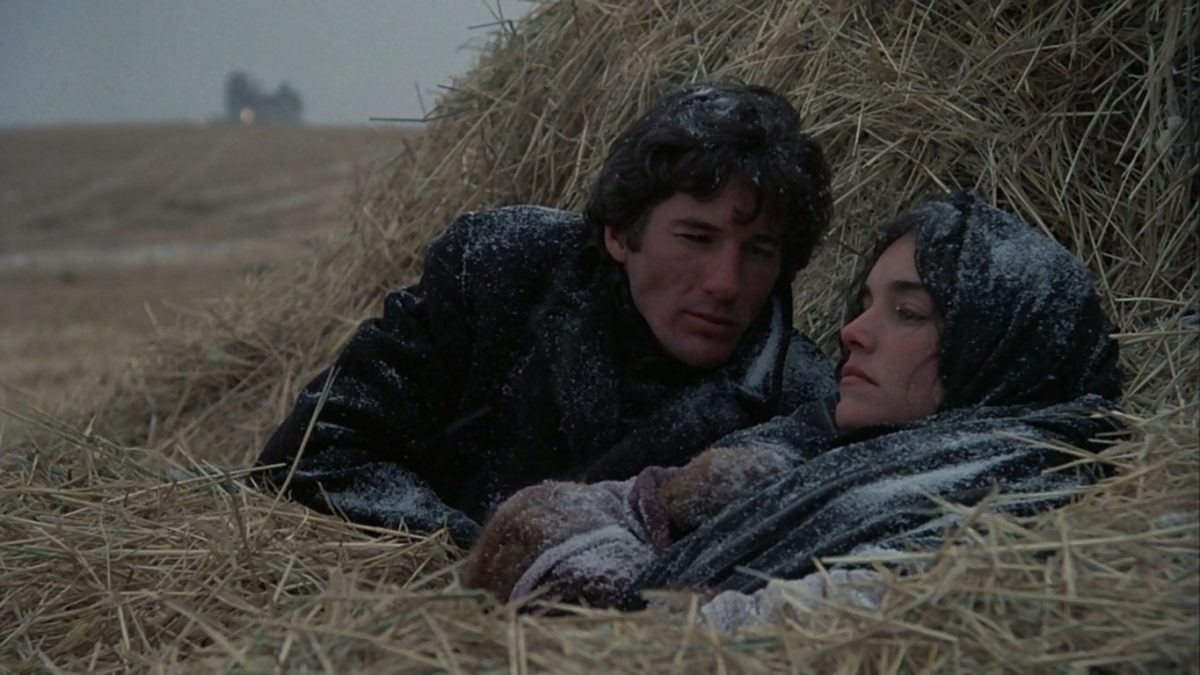
Days of Heaven was obviously Malick’s last film for two decades before The Thin Red Line. Did you touch base at all with him during that time?
No, he’s very private and I’m not a terribly social person either. I don’t really reach out, as much as I love to get to know people on films or while I’m doing plays or whatever. I grew up doing my father’s summer theater, and every summer we would have an entire family of people and then the summer would be over and I’d never see them again. And that’s kind of what it’s been like through my whole career.
Have you seen anything he’s done after Days of Heaven with The Thin Red Line and onward?
Oh, sure. I saw The Thin Red Line and I saw the one about Pocahontas.
Yes, The New World.
Yeah. Sure. I’ve seen them all. I just think he’s so great.
I’m just curious, being an actor in one of his most iconic movies, what is it like to see an artist evolve so fully in his personal artistic pursuits? Is there a joy in seeing a director follow his own path?
Oh, yeah. Absolutely. There’s nobody like him. I totally admire him. I mean, what can I say? I think he’s great.
It was kind of a coincidence, but this year I saw four films you were in, including rewatching Days of Heaven, Invasion of the Body Snatchers, then the new restoration of Tell Me a Riddle at the New York Film Festival and then Vengeance Is Mine. With some of these films not getting as much reception when they first came out, what has it been like to see these incredible acting showcases find new audiences for you?
It’s been fabulous, especially since I haven’t been acting for a while. I kind of thought, “Well, my career is just over and who remembers me and stuff.” But then after Vengeance Is Mine, after they invited me down to see it at the Film Forum, I went and did some Q&As at other places with it, then they asked me to do a retrospective at Harvard of my films. So suddenly I felt like, “Wow, I am in the canon of films” and I felt fantastic. It was just such a joy for me to feel that way again. As an actress I always wanted so much, of course, to be remembered. And it’s a way to be remembered even after you die. And I thought, “Well, I’m not going to have that now.” And now I kind of feel like I will. And because I’m doing this play again, I just I feel like, “Oh boy, everything is possible.” It’s very exciting. And now, just to brag a little, I also got accepted to an artist residency in France as a painter and a writer.
That’s amazing.
So in February, I’m going to go to France to write and paint for a month at the Chateau d’Orquevaux. And I’m doing this play which closes at the end of December. So I feel like I’m very happening right now.
The new 4K restoration of Days of Heaven opens at Film Forum on Friday, December 8 with Brooke Adams in-person, and is also available in a new 4K UHD release from the Criterion Collection.


